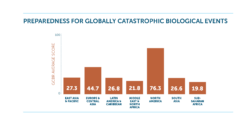- Analysis
- December 8, 2021
Global Catastrophic Biological Risks (GCBRs) refer to biological risks of unprecedented scale, with devastating outcomes that are orders of magnitude greater than what the world has witnessed with the COVID-19 pandemic. Such events could cause such significant and irreparable damage to human civilization that they undermine its long-term potential.
Although the effects of the pandemic have been severe, it should be treated as a warning shot. Increasing urbanization and human expansion, declining biodiversity and a changing climate, and upticks in travel, trade, and terrorism all contribute to increasing the risk of a globally catastrophic biological event. At the same time, the use of advanced biotechnologies in the absence of strong, normative guidance on responsible science increases the chances that a GCBR will emerge by human hands, either accidentally or deliberately.
The GHS Index framework includes consideration of countries’ readiness for GCBRs through 21 subindicators that are tailored to measure national capacity to prevent, detect, and respond to high-consequence biological events before they become catastrophic. Despite the grave nature of those risks, decision makers are still not planning for catastrophic events, such as those that could be caused by novel or engineered biological agents.
In 2019, the GHS Index found that national capacity in those areas was generally weak, with 75% of countries receiving a low score for biosecurity, oversight for dual-use research, emergency response operations, linking of public health and security authorities, and medical countermeasure dispensing.
The 2021 analysis of the same capacities suggests that even when confronted with a global pandemic, national capacities to manage large-scale biological events have not been prioritized and continue to be neglected. On average, the world scores 29.6 out of a possible 100 in GCBR-relevant subindicators.
